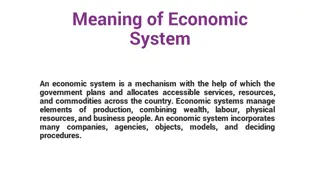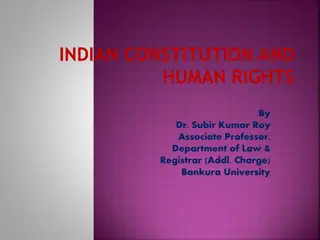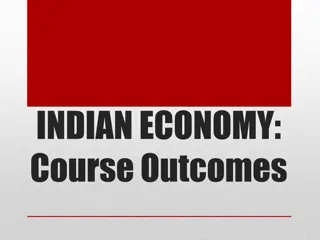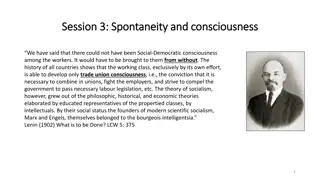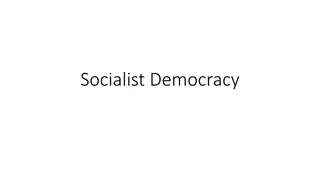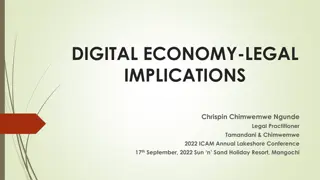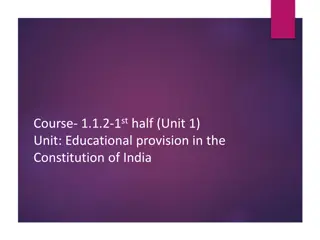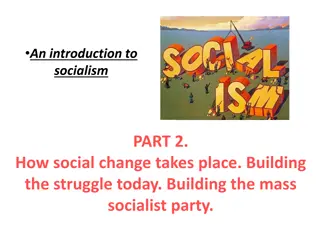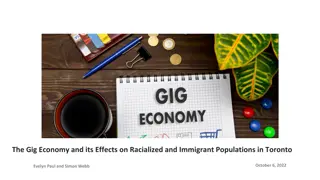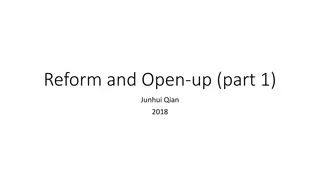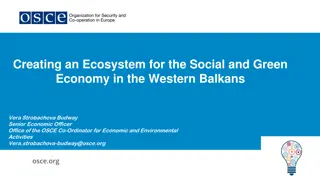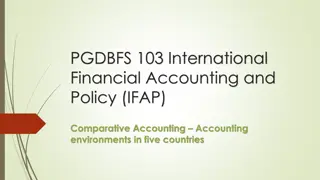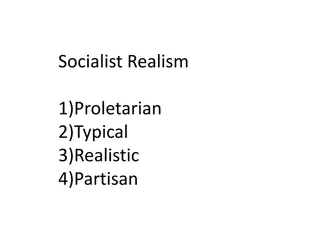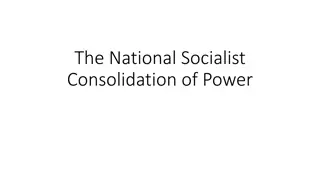Glossary of Key Terms
Explore essential terms in economics such as command economy, consumer, demand, economic system, free enterprise system, goods, innovation, market economy, marketplace, mixed economy, needs, producer, profit, resources, scarcity, services, supply, technology, trade-off, traditional economy, and want
3 views • 6 slides
Understanding Economic Systems and Sectors
An economic system is a mechanism through which the government plans and allocates resources and services. Types include capitalist, socialist, and mixed economies, each with distinct characteristics. The central problem of the economy is managing scarcity. The economic sector comprises the primary,
2 views • 5 slides
Leveraging Non-Oil Exports for Nigeria's Blue Economy Growth
Nigeria Export Promotion Council (NEPC) focuses on diversifying Nigeria's economy by promoting non-oil exports for sustainable growth. The Blue Economy concept involves sustainable use of ocean resources for economic development. Nigeria's abundant ocean resources such as maritime transportation, fi
0 views • 20 slides
Exploring Responsibility and Social Change in 'Young and Old' Play
In the play "Young and Old," the characters Eric, Sheila, and Gerald represent the younger generation, while Arthur and Sybil symbolize the older generation. The story delves into the concept of responsibility, highlighting the different attitudes towards Eva's death. Arthur and Sybil, despite being
0 views • 9 slides
George Bernard Shaw: Influential Playwright and Social Critic
George Bernard Shaw, an Irish playwright, social critic, and political activist, is renowned for his witty language and social criticism in works like "Arms and the Man," "Pygmalion," and "Saint Joan." Shaw's influence on British socialist theory through Fabianism and his embodiment of realism in En
0 views • 25 slides
Indian Constitution and Human Rights: A Comprehensive Overview
The Indian constitution embodies justice in social, economic, and political spheres, aiming for the full development of every individual. Rooted in democratic principles and socialism, the preamble emphasizes liberty, equality, and justice. Drawing wisdom from leaders like Dr. Ambedkar and Mahatma G
0 views • 10 slides
Understanding Indian Economy: Course Outcomes and Resources
Explore the course outcomes of the Indian Economy, covering economic development, policies, population growth, planning, agriculture, Kerala's economy, and resources for further study. Access government data and publications on the Indian economy for comprehensive learning.
0 views • 9 slides
The Role of Consciousness in Social-Democratic Thought
The development of socialist consciousness among the working class is discussed, emphasizing the need for outside influence to foster class and political awareness. Key figures such as Lenin and Kautsky are cited in their exploration of how consciousness is acquired and its significance in the labor
0 views • 6 slides
Contextual Evolution in J.B. Priestley's Play: An Inspector Calls
J.B. Priestley's play "An Inspector Calls" was set in 1912 but written in 1945, reflecting the significant changes in society between these years. Explore the context and events that influenced Priestley's work, showcasing his socialist views and the impact of historical events like WWI and WWII on
0 views • 12 slides
Features of China's 1982 Constitution
The 1982 Constitution of China, drafted after extensive discussions, adheres to socialist principles and emphasizes the socialist system as the foundation of the state. With a total of 138 Articles, it is a flexible document allowing for easy amendments and maintains a unitary system with centralize
2 views • 13 slides
Evolution of Companies and Global Business Impact
The presentation delves into the historical evolution of companies, from ancient multi-nationals to modern global corporations. It explores the intertwined relationships between economic expansion, colonialism, capitalism, and socialist movements. The presentation also discusses the role of companie
0 views • 20 slides
Understanding Socialist Democracy: A Political Ideology Explained
Socialist democracy is a political idea that combines elements of democracy and socialism, rejecting capitalism and authoritarian socialism. Proponents advocate for democratic decision-making and public ownership of the means of production. They believe in economic equality, government regulation of
2 views • 13 slides
Legal Implications of the Digital Economy in Malawi
Explore the legal implications of the digital economy in Malawi as discussed at the ICAM Annual Lakeshore Conference. Topics include the Electronic Transactions and Cyber Security Act, principles of implementation, Malawi CERT, data privacy, and the significance of the digital economy in transformin
0 views • 44 slides
Directive Principles of State Policy in the Indian Constitution
The Directive Principles of State Policy in the Indian Constitution provide guidelines for governance, focusing on social justice, economic welfare, and a just society. These principles are inspired by socialist ideology and aim at ensuring social and economic justice by minimizing inequalities, pro
2 views • 16 slides
Overview of Modern Business Environment in Indian Economy
Modern business in the Indian economy is characterized by large size, oligopolistic nature, diversification, global presence, technology orientation, and changing government regulations. The Indian economy features a mixed economy with both private and public enterprises, low per capita income, uneq
0 views • 14 slides
Insights into India's Thriving Gig Economy and Future Work Trends
India's gig economy, spearheaded by initiatives like IWWAGE, is reshaping the future of work, particularly for women. Key questions revolve around the gig economy's impact, legislative frameworks, and COVID-19 repercussions. Academia investigates the rise of gig work, focusing on platforms like Uber
0 views • 11 slides
The Blue Economy and Marine Pollution: A Comprehensive Overview
The presentation outlines the thriving ocean economy, the concept of the Blue Economy, the World Bank's approach, risks faced by oceans, and the impact of marine pollution on Small Island Developing States and coastal regions. It emphasizes sustainable development of oceanic activities, collaboratio
1 views • 12 slides
Evolution of Parental Leave Policies in Bulgaria: A Historical Overview
Explore the transformation of parental leave policies in Bulgaria from the socialist era to the modern EU influence. The seminar delves into the progression of rights and entitlements for parents, inclusive of various family structures and dynamic societal needs. Key topics include paid parental lea
0 views • 18 slides
Role of Money in a Socialist Economy
Money in a socialist economy serves various essential functions such as a measure of value, medium of circulation, means of payment, accumulation, and distribution, along with providing monetary incentives and freedom of choice to individuals. It plays a crucial role in evaluating economic activity
0 views • 5 slides
Building Socialism: Strategies for Social Change and Political Action
Explore the process of social change towards socialism through mass action, organization, and the building of a socialist party. Emphasizing the importance of campaigns, reforms, and transitional methods, the journey involves uniting the working class, challenging the capitalist system, and particip
4 views • 10 slides
Data Coops and Power Dispersal in Digital Society
Michele Loi from the Digital Society Initiative at the University of Zurich discusses the concept of data cooperatives and their role in distributing data power. These cooperative structures allow for democratic control over data management, emphasizing individual ownership and shared asset utilizat
0 views • 19 slides
Insights into Social Economy and Social Dialogue Research Outcomes
Research outcomes from the Mesmer+ project at HIVA KU Leuven reveal misalignments in social dialogue inclusiveness, challenges faced by social economy entities, and the role of employers in the social economy. Recommendations include enhancing the role of social economy employers and promoting inclu
1 views • 7 slides
Insights into Animal Farm: A Narrative of Betrayal and Manipulation
The narrative of Animal Farm encapsulates the evolution from an idealistic society to a manipulative regime, illustrating themes of betrayal, rule violations, manipulation, leadership exaggeration, harsh penalties, rumor spreading, forced labor, and emotional suppression within a communist-socialist
0 views • 10 slides
Exploring the Green Economy and BRICS Cooperation
The discussion focuses on the importance of the green economy for BRICS nations, suggesting ways for collaboration, especially in addressing climate change and transitioning to a low-carbon economy. The BRICS countries play a crucial role in global stability and sustainable development. Features of
0 views • 22 slides
The Impact of Pandemics on the Shadow Economy Performance
Pandemics have a significant impact on the shadow economy, influencing the legal economy in various ways. The shadow economy serves as a buffer for high unemployment rates and can contribute to budget revenues through legal spending. Studies suggest that a growing shadow economy may reflect dissatis
0 views • 12 slides
Evolution of Services Marketing in the Modern Economy
The shift towards a service economy has transformed marketing practices, leading to the emergence of Services Marketing as a distinct discipline. This evolution highlights the unique characteristics of services, such as intangibility and simultaneous production-consumption. The 1980s mark a pivotal
0 views • 13 slides
The Rise of Adolf Hitler and the Nazi Party: A Historical Overview
Adolf Hitler, born in Austria in 1889, faced rejection as a painter before turning to politics. He led the National Socialist German Workers Party (Nazi) and orchestrated the failed Beer Hall Putsch in 1923. Imprisoned briefly, he penned Mein Kampf that propagated Nazi ideology. By 1932, the Nazi Pa
0 views • 15 slides
Rise of Mussolini in Italy and Weaknesses of the Liberal Monarchy
The historical timeline of Italy before 1919 led to Mussolini's rise to power through various events such as his involvement with the Italian Socialist Party and the formation of the Fascio di Combattimento. Italy's Liberal Monarchy faced weaknesses, including political divisions between progressive
0 views • 35 slides
Election of 1912 and Its Impact on APUSH Students
Explore the dynamic Election of 1912 in US history, featuring William Howard Taft, Theodore Roosevelt, Woodrow Wilson, and Eugene Debs. Learn about the split in the Republican Party, Wilson's victory, Debs' Socialist impact, and the rise of the Progressive Party. Subscribe for more educational conte
0 views • 5 slides
Understanding the Impact of the Gig Economy on Marginalized Groups in Toronto
This report delves into the effects of the gig economy on racialized and immigrant populations in Toronto. It outlines research findings, stakeholder insights, and strategic recommendations to address the challenges faced by marginalized groups in the gig economy. The study aims to shed light on the
0 views • 25 slides
The Learning Consortium for the Creative Economy Webinar Summary
The webinar on The Learning Consortium for the Creative Economy discussed key topics such as agenda details, presenters' backgrounds, poll results, and insights on the Creative Economy and its importance. Participants engaged in discussions on topics like the Recap on the Creative Economy, Scaling o
0 views • 43 slides
Rental Sector Trends and Policy Evolution in Slovenia and Serbia
Explore the evolution of the rental sector in Slovenia and Serbia, from the socialist order to privatization and the current challenges faced in providing social housing. Key events, documents, and legislative acts have shaped the rental landscape in these transition countries, impacting ownership r
0 views • 16 slides
Rental Tenures in Slovenia: Insights from Post-Socialist Countries
Slovenia exhibits a unique tenure structure with a high percentage of home ownership and specific regulations governing rental tenures. The 2003 Housing Act defines various rental types, including non-profit and market-based rentals, while legislation outlines rules on contracts, rent regulation, an
0 views • 13 slides
Reform and Open-up: The Evolution of Chinese Rural Economy
This article delves into the historical background and key events that shaped the reform and open-up policies in China, focusing on the transformation of the countryside, the rise of Township and Village Enterprises (TVEs), and the implementation of the Household Responsibility System (HRS). It disc
0 views • 28 slides
Coal Combustion Products & the Circular Economy - Addressing Resource Flow Challenges
This discussion delves into the intersection of coal combustion products and the circular economy, emphasizing the need for continuous re-evaluation of resource chains, ecosystem metabolisms, and industrial innovations to ensure sustainable environmental practices and economic growth. Exploring the
0 views • 24 slides
Advancing Social and Green Economy in Western Balkans
Creating an ecosystem for social and green economy in the Western Balkans is crucial for fostering peace, reducing disparities, and promoting sustainable business models. Initiatives like promoting innovation, job creation, and skills development among young entrepreneurs are key to driving growth a
0 views • 7 slides
Accounting Environment in Peoples Republic of China (PRC)
The accounting environment in Peoples Republic of China (PRC) has undergone significant changes from a planned economy to a socialist market economy. With the emergence of private enterprises and foreign investments, the accounting profession has evolved as well. Guanxi, the concept of networks and
0 views • 22 slides
Soviet Socialist Realism: Artistic Representation of Revolutionary Development
Socialist Realism emerged as the fundamental method of Soviet literature and art, emphasizing truthful and historically concrete depictions of reality within a revolutionary context. It required artists to engage in ideological transformation and educate the masses in the spirit of socialism. This a
0 views • 21 slides
Insights from Yugoslavian Economic Growth Model Analysis
This paper revisits socialist growth in Yugoslavia, focusing on model-based assessment of economic determinants and findings related to Total Factor Productivity (TFP) growth. The model decomposes output growth deviations, discussing factors like efficiency wedge, labor wedge, investment wedge, and
0 views • 12 slides
The National Socialist Consolidation of Power - Legal Revolution in the Reichstag
Hitler's consolidation of power in Germany involved strategic maneuvers such as exploiting the Reichstag fire to pass emergency decrees, suspending civil liberties, and ultimately passing the Enabling Act, granting him dictatorial powers. These actions allowed Hitler to establish a totalitarian regi
0 views • 23 slides

